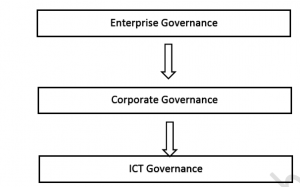ICT GOVERNANCE
CORPORATE GOVERNANCE
Corporate governance is the system by which companies are directed and controlled. Boards of directors are responsible for the governance of their companies. The shareholders’ role in governance is to appoint the directors and the auditors and to satisfy themselves that an appropriate governance structure is in place. Can also be defined as ethical corporate behavior by directors or those charged with governance in creation and reservation of wealth in an organization. It influences how the objectives of the organization are set and achieved and how risks are monitored so as to optimize the organizations performance.
5.1 ENTERPRISE GOVERNANCE
Enterprise governance is defined as “the set of responsibilities and practices exercised by the board and executive management with the goal of providing strategic direction, ensuring that objectives are achieved, ascertaining that risks are managed appropriately and verifying that the organization’s resources are used responsibly.
5.2 ICT GOVERNANCE
ICT Governance is about the decisions an organization makes to ensure that ICT is working towards achieving the business and ICT strategies, including who is involved in making those decisions and how those decisions are made. In general is about who makes decision and it tries to answer the following questions:-
i. What decision must be made?
ii. Who should make these decisions?
iii. How are the decision made and monitored? ICT Governance is the responsibility of the board of directors and executive management. It is an integral part of enterprise Governance and consist of leadership of the organization structure and process that ensures that ICT infrastructure sustains and extends.
ICT Governance hence can be defined as the organization’s capacity exercised by the board and the executive management to control the formulation and implementation of ICT.

Despite the relationship between ICT management and ICT governance, the two concepts remain different. ICT management is charged with providing effective ICT services while ICT governance is much broader and it focuses on transforming ICT so as to meet the demand of the business.
ICT governance is part of much broader corporate governance and it follows the principles of corporate governance which includes: –
i. Effectiveness
ii. Transparency
iii. Accountability.
ICT governance reflects on corporate governance principle focusing specifically on the management and use of ICT to achieve performance goals.
ICT is an Umbrella term that includes any communication devices or applications e.g. radio TV, computers, Telephone Networks and any other associated hardware and software.
ICT governance therefore covers particularly those technologies that are used within business environment for service delivery.
ICT governance within a business is primarily concerned with the management of ICT resources which are strategic to the business.
POLICIES AND PROCEDURES
Policies and procedures are designed to influence and determine all major decisions and actions, and all activities take place within the boundaries set by them. Procedures are the specific methods employed to express policies in action in day-to-day operations of the organization.
General ICT policies and procedures.
Policies
i. ICT Security Policy
ii. Mobile Device Management Policy
iii. Information Classification standards
iv. Protection of Personal Information (POPI) policy
v. Project Management Methodology
vi. Risk Management Policy
vii. Backup policy
viii. Terms of reference for ICT Steering Committee
Procedures
i. User account management procedure
ii. Incident and problem management procedure
iii. Change management procedure
iv. Access to server room procedure
v. IT procurement and asset management procedure
vi. IT Help desk procedure
vii. Software license management procedure
viii. Backup procedure
ix. Risk management procedure
(adsbygoogle = window.adsbygoogle || []).push({});

3 thoughts on “ICT GOVERNANCE”
Comments are closed.